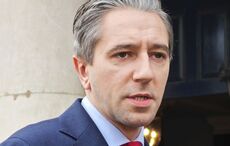Google the name Jeremy Corbyn – the front runner for leader of the UK's Labour Party – and you'll discover just how nervous his candidacy is making British politicians of every stripe.
"The Labour party is in the worst danger in its 100-year history and faces possible annihilation if Jeremy Corbyn wins the leadership," former prime minister Tony Blair thundered this week.
Northern Irish unionists are nervous too. Corbyn has been described as a longtime ally of Gerry Adams and Martin McGuinness of Sinn Fein which is why his candidacy is alarming many unionist politicians. Even his rival for Labour leadership Liz Kendall claimed this week that if Corbyn is elected he will threaten Northern Ireland's peace process.
Kendall reminded the press that Corbyn stirred up controversy in the weeks after the Brighton bombing in 1984 by inviting Adams and other members of Sinn Fein to the House of Commons. Then in 1987 he observed a minute’s silence for the eight IRA members killed by a 36 man unit of the SAS in an ambush in Loughgall.
In an interview with BBC Radio Ulster Corbyn, during which he was repeatedly challenged to condemn IRA actions, replied: “I condemn all bombing; it is not a good idea, it is terrible what happened.”
Later he added: "Look I condemn what was done by the British Army as well as the other sides as well. What happened in Derry in 1972 (Bloody Sunday) was pretty devastating as well."
Even on social issues Corbyn's views are at odds with mainstream unionism. He has vowed to bring same-sex marriage to Northern Ireland if he becomes Prime Minister, for example.
Tony Blair will recall how Corbyn has defied his own party whips over 500 times, including over the UK's involvement in the Iraq war. His unexpected rise must deeply rankle the former prime minister.
But when you actually look at Corbyn, 66, in his beige zippered jackets offset with beige pants and tan sandals, through which you can clearly see his socks, it's hard to see the epic danger that Blair or most of the country's now right-of-center press does.
Instead what voters see is a quietly committed British Labour Party politician who has been the Member of Parliament for Islington North since 1983.
But Corbyn's passionate anti-austerity message has given him what career politicians dream of having: zeitgeisty buzz. He's trending among UK voters, especially the young, because he stands apart from what most UK voters have grown to despise: primetime ready politicians who poll test every move they make from how they look to what they stand for.
There is another factor that may explain Corbyn's sudden appeal: inevitability. Voters clearly loathe the message coming from Blair and his centrist cohorts on both the left and right that their way is the only way for the nation. That contention only makes the public's temptation to hit the reset button stronger.
So whilst Corbyn's critics have spent all their time handwringing or becoming hysterical over his unlikely ascension, they really haven't given sufficient thought as to why it's occurred.
A recent YouGov opinion poll suggests that Corbyn, a lifelong socialist and teetotaler, is heading for a landslide victory in the leadership contest, because rivals Andy Burnham, Yvette Cooper and Liz Kendall have all failed to enthuse the electorate.
For weeks critics on the left and right have contended that veteran left-winger has no broad appeal, but another recent YouGov poll found that Corbyn was the first choice of Londoners to lead Labour, contradicting previous claims that his appeal is limited to left-wingers and trade unionists.
Interestingly, he is popular with well-off voters, the young, the old, Liberal Democrats and even Ukip (far right) voters.
Although he's noted for holding strong political views, his manner at all times is described as personable and measured. But Corbyn is also known for saying what he thinks and meaning what he says, and this quality is resonating with voters eager to challenge the Tory party's lock on political power.
His views are well known. Corbyn supports higher taxes on the rich and public, rather than private, ownership of the national railways and energy companies. He has vowed to abolish the UK’s Trident missile program and do away with private schools.
He has also claimed he would withdraw the UK from the NATO alliance.
But, most of all, Corbyn's rise has highlighted the yawning gulf between Labour party grandees and its trade union and young voter base. Party leaders maintain his rise is a dangerous form of popular protest, an over reaction to the recent Tory rout, insisting his brand of principled politics belongs to the past, because poll-tested centrist politics is the modern way, they contend.
But the greatest challenge Corbyn faces as a longtime backbencher is to convince supporters and critics that he is ready for the challenges of managing and controlling his own parliamentary party.
The Tories have steeled themselves to dismantle as much of the welfare state and the public sector as they can between now and 2020. Labour will need to present a united party and a credible platform to battle against them. It remains to be seen if Corbyn has what it takes to do it.




Comments